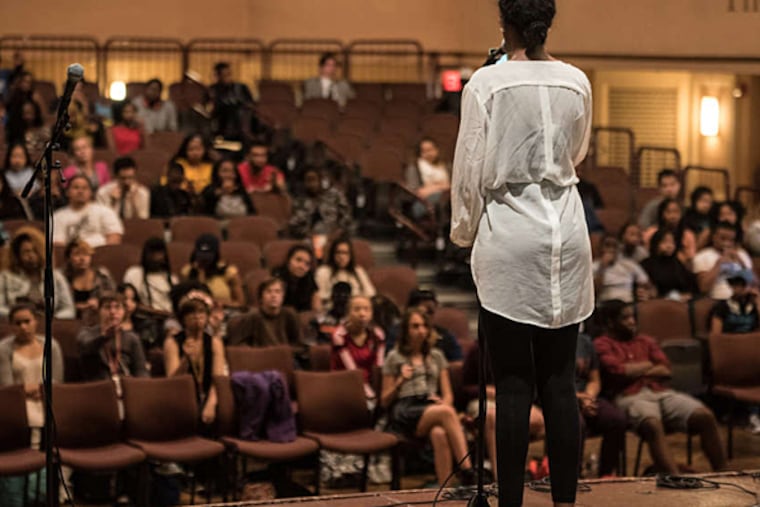Young poets use their words to make their world
'PY!", a voice called from within the crowd. "PM!", the audience screamed back. It was clear everyone knew the Team Black! chant was - as Perry "Vision" DiVirgilio, award-winning poet and mentor for the Philadelphia Youth Poetry Movement (PYPM), puts it - an "homage to going all the way in."

'PY!", a voice called from within the crowd. "PM!", the audience screamed back.
It was clear everyone knew the Team Black! chant was - as Perry "Vision" DiVirgilio, award-winning poet and mentor for the Philadelphia Youth Poetry Movement (PYPM), puts it - an "homage to going all the way in."
And that the response, "Dashikis and war paint, aaahh!" meant their souls were about to beat into their poems.
The PYPM chant filled the auditorium Friday at the University of the Arts as the poets of the Western division took the stage in front of 100 of their peers to fight for spots on the Slam League championship team in the last of five spoken-word battles held throughout the three-month season. It marked the final hurdle for the young poets before the highly anticipated PYPM final for city bragging rights on June 5 at the University of the Arts.
DiVirgilio remembers when the PYPM weekly workshops, started nine years ago by poet Greg Corbin, had "no money, no budget, no nothing" and only eight students. But spoken word eventually took off, mostly by word of mouth, and grew to 40 to 60 students a week. This year, PYPM has almost 300 participants and also works with middle schoolers at John B. Stetson in North Philadelphia.
Corbin, 34, recruited DiVirgilio in 2009 and a year later was joined by three other local poets, Matthew Kay, Cait Minor, and Denice Frohman. Corbin says the program provides a platform where youth "can express themselves without feeling judged or shamed for how they feel."
DiVirgilio is accustomed to seeing his young poets nervously enter the waters. "Almost everyone who's not a veteran is nervous - you can hear their voice shaking," says DiVirgilio, but calming them is simply about "creating the right atmosphere." DiVirgilio emphasizes that support is key to building a strong community. "It's a matter of getting on stage and seeing that the crowd is loving."
During Friday's semifinals, one young poet began to break down. His eyes filled with tears and his voice broke as the emotions in his poem about his mother got to him. Audience members immediately put their hands up, as though to catch him or to help carry the weight of his words.
DiVirgilio said he and the crowd show the performers, "Hey, we're here with you. We're supporting you."
The loving crowd is what Julian Jefferson, 17, a senior at J.R. Masterman High School, remembers from his first poetry slam as a sophomore. "It was just a really nice feeling to be there."
"There's a trust in PYPM," Jefferson said. "We honor each other's poetry."
"I feel a lot closer to the poets," Jefferson added, "mainly because other people are going up and sharing their stories." He said for him, sharing poetry was almost like sharing secrets.
The plights of the performing poets ranged from being tall in a small world to menstrual pains to family issues, race relations, and discrimination.
"It was easy to write about what I felt," Jefferson said. "Sometimes, I'd write about not knowing what to write about."
Corbin says giving youth a voice is at the root of the program. "We're doing them a disservice when we teach them with a curriculum that they don't have a voice in," Corbin observed. "There aren't enough youth voices when you look at systematic structure, whether its policy, curriculum, or religion."
PYPM students are able to put their deepest emotions into words once given the platform, a virtue DiVirgilio says is lacking in the adult poetry scene.
"The older we get, the more walls we put up. Youth poets don't know to have those walls."
DiVirgilio and the other mentors spend three days a week and upward of eight hours a day with their students, giving them a front-row seat to powerful transformations. "When I don't have to say anything to them" is when DiVirgilio says he knows his students have grown.
Corbin says he started PYPM because of Philly's lack of open-microphone venues for youth when he and DiVirgilio started out as young poets in the early 2000s. However, "poetry is just the means to get us all in one building," DiVirgilio says. The end goal, Corbin says, is to learn skills such as "making eye contact, not being afraid of speaking with conviction, posture, and critical-thinking skills. These are certain things you can carry into the workforce."
Corbin emphasizes: "It's not about building a better poet; it's about building better people. Poets change the world, but the person carries on the legacy."
And for DiVirgilio, that legacy also means filling his shoes - "knowing that when I leave, when I no longer want to perform, that the city is in good hands."